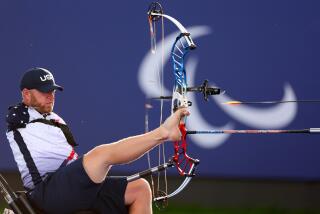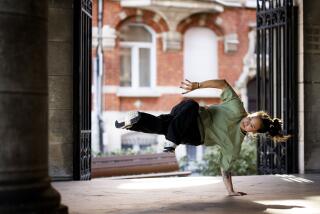THE SEOUL GAMES / DAY 7 : Fencing : Sport Is Opening Up to New Participants
- Share via
SEOUL — She was raised by her mother in a ghetto in the Bronx. In high school, she played a little volleyball, ran some track. One day she noticed a sign in the locker room: Anyone interested in trying out for the co-ed fencing team? Sharon Monplaisir was curious. She made a decision that changed her life “180 degrees.”
In Newark, N.J., Peter Westbrook also grew up under lean conditions, a street kid, the son of a black American father and Japanese mother. The mother worried about her son but remembered relatives in Japan who fenced. One day she said, “Peter, here’s $5. Please try to fence.” She told him where. Skeptically he replied, “Fence? What’s that? Just give me the $5.” Then, he, too, made a crucial decision. He went.
Both knew that their neighbors didn’t fence, but neither realized the extent to which fencing is a sport of the white and wealthy.
“Yes it is, as you can see,” Westbrook said, watching the foil competition in the Olympic fencing gymnasium. But he wasn’t referring to his own country. Not anymore. Five of the 21 U.S. fencers are black. Only in America is the face, and fabric, of fencing changing.
Westbrook, 36, is largely responsible. An 11-time national champion and bronze medalist in saber in the ’84 Olympics, he is not only a pioneer but the dean of American fencing. He has attracted proteges to the sport. He’s a corporate executive in Manhattan. He has gone from the streets of Newark to the pages of GQ.
Monplaisir, 27, majored in psychology at Hunter College, worked every spare moment to support herself and trained at night. “We were extremely poor. We lived in horrible neighborhoods. Right now, I’m a sales rep for a computer firm. I mean, my life went from night to day.
“I’ve met some wonderful people in this sport, people who helped me grow up, taught me discipline, showed me how far hard work can take you.”
Certainly there was luck--a high school coach who saw her talent, who took her to the New York Fencers Club and introduced her to a Soviet master. She got her break, but she had the tenacity to parlay it into a place on the ’84 Olympic team and now the ’88 team, into international travel and a job in Manhattan.
She had been eliminated in foil in the second round, but she still had the team competition ahead. That, and the decision whether to continue fencing at this level.
At the Olympic level, the costs are steep, but she said that should not deter beginners. “You can start fencing with just a foil, a mask, a glove and maybe a pair of tennis sneakers,” with an outlay of $300 to $400.
“Bravo,” shouted Michael Lofton, also black, a four-time NCAA champion, as Peter Lewison, another black, scored a point against a new victim from Japan. “This is exciting,” said Westbrook, on the team bench and shouting encouragement. Westbrook, who is 5 feet 9 1/2 tall and does not have the longest arms, has perfected an attack that he springs from his defense. He’s dynamic in action, charming otherwise. He has no idea where he would be if it weren’t for fencing.
He won a fencing scholarship to New York University, where he majored in marketing and economics. For 15 years he has been coached--and accidentally stabbed--by Csaba Elthes, formerly of Hungary, now of New York, eight times an Olympic coach and “a mean father” who “doesn’t say too many nice things about me. When I won the bronze medal, he said, ‘You jerk, you could have a gold medal. You had it in your hand.’ Which I did.”
Lewison had won again. Westbrook said, “I love the sport. I love being around great people. I’ve never felt any prejudice. I was taken in very quickly.
“Most people in fencing are well-to-do, from any country. You do get an elite type of person involved. Financiers. Doctors. But these doctors are just as crazy as the nuts on a basketball team or a football team. Crazy is crazy.
Non-playing captain Carl Borack agreed. “Not everybody can be Magic Johnson. Not everybody can be Doug Williams. But you can be a fencer. You can be a strong athlete--just apply it in another direction. I think if Peter Lewison wasn’t such a good fencer, he might make a great team handball player.”
By now, Lewison had won three of four bouts. He was about to take on the Soviet Union’s Alexandre Romankov.
One more victory would move Lewison, 26, into the final round. That, said Borack, “would be an unbelievable result.”
Lewison lost, 10-1. His teammates and coach gathered around him. Lewison kept his head high, for he, too, had come a distance he could never have imagined.
More to Read
Go beyond the scoreboard
Get the latest on L.A.'s teams in the daily Sports Report newsletter.
You may occasionally receive promotional content from the Los Angeles Times.






